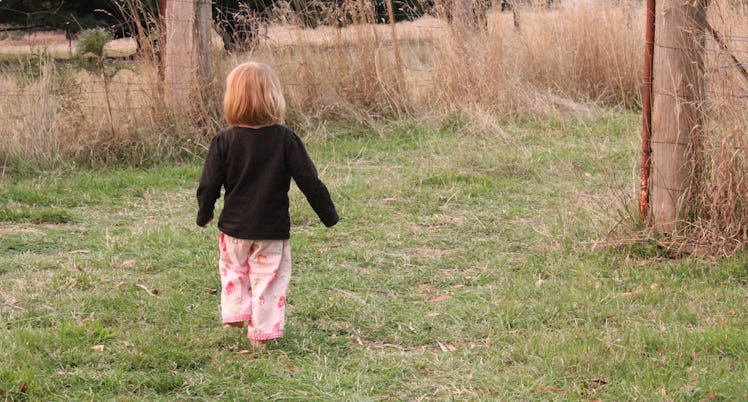What I Wish Someone Told Me Right After My Daughter Was Diagnosed With Down Syndrome
It's not like he feared it would be.

The following was syndicated from Quora for the Fatherly Forum, a community of parents and influencers with insights about work, family, and life.
What is it like to find out your child has down syndrome?
There are 4 of us in our family. There’s a mummy and a daddy (Hannah and Tim, from this point on referred to as “we”), there’s an older brother Austin (he’s 5) and a younger sister, Laurie (she’s 4).
Laurie loves putting her dolls to bed, going to school, bouncing on the trampoline and being chased. Laurie was also diagnosed with Down Syndrome Trisomy 21 at 9 weeks old.
Austin loves Star Wars, Superman, bats and dinosaurs and wants to be a superhero when he grows up. We’re a normal family.
Now that’s a fairly bold statement. What’s normal? Well, normal for us is sometimes staying in our pajamas until lunchtime on a Sunday. Normal is 2 children fighting over a lightsaber whilst dressed as a fairy and a werewolf; all standard family things. I guess we like to think of ourselves as normal with additions or normal plus.
Laurie was born at home, in our bedroom (all planned by the way) after a very calm, very quick labour at 7.30 AM on April 13, 2012. Austin met her later that day once he had come home from nursery. We said “Austin, this is your new baby sister, Laurie.” He looked at her, looked at us and simply said “Lalu” And that’s what she’s been called by family and friends ever since.
We got on with having a new baby for another 8 weeks and it was at her 8-week check that we asked the GP to have a look at her feet (she had a large gap between her big and second toe) and a week later we had a diagnosis of Down Syndrome, that was the start of a new leg of our journey.
It was a shock, a big adjustment. So what happened next?
We concentrated on family life for a bit. We told family and very close friends, but we didn’t worry about telling other people at that point – we focused on getting into a routine as a family and giving our children as much love as possible and that helped us to stay grounded and look after ourselves. Then, when we were ready we let people know our family news and made sure they knew we were comfortable to talk and answer any of the questions that, of course, it was natural they wanted to ask.
We are fortunate to be able to say our families on both sides are fantastic. They are keen to learn all about our day-to-day routines and what they can do to help. It is invaluable to know that someone is there if things are a little tough, which they can sometimes be.
We learned about the way our daughter, or any individual with a diagnosis of Down Syndrome, learns and processes information and health professionals (and new friends alike) have provided us with, and encouraged us to use, techniques and tools to help Laurie to blossom and thrive as an individual who enjoys learning about and participating in the world around her.
You can set in place ways to help your children when they’re older and ways to help them when you’re gone.
This has had a positive impact on the way we see ourselves as parents, as we feel able to help her to the best of our ability, because we are learning how she learns, how she thinks and in this we know we are doing the best to help her to be all that she has the potential to be.
We have challenges. Sometimes it feels like an uphill struggle. But, we feel lucky, we feel blessed. Are there things we wish we’d known? Well, the winning numbers for the lottery for one! You can’t know the future but you can make plans for your family. You can set in place ways to help your children when they’re older and ways to help them when you’re gone.
But surely the healthiest way to live, for yourself, for your family is to be in the here and now, enjoying each other, being a family and accepting the challenges that come: because they will come. Because that’s life.
If we were to write a letter from ourselves now, to ourselves at the beginning, it would possibly go something like this:
“Dear us,
Don’t worry too much. You’re actually going to be fine.
Your children are beautiful and incredible and amazing and sometimes annoying and infuriating and they’re going to make you laugh every single day.
Try not to worry about things that haven’t happened yet.
Plan well, but enjoy each day…
You’ll be fine.”
Tim Heyes is a tech geek, metal fan, entrepreneur, and down syndrome ambassador.
This article was originally published on